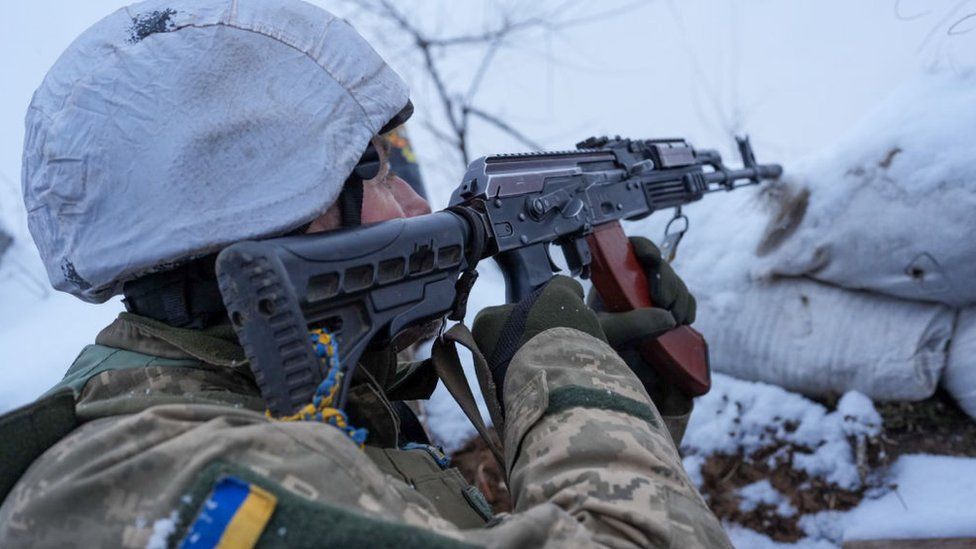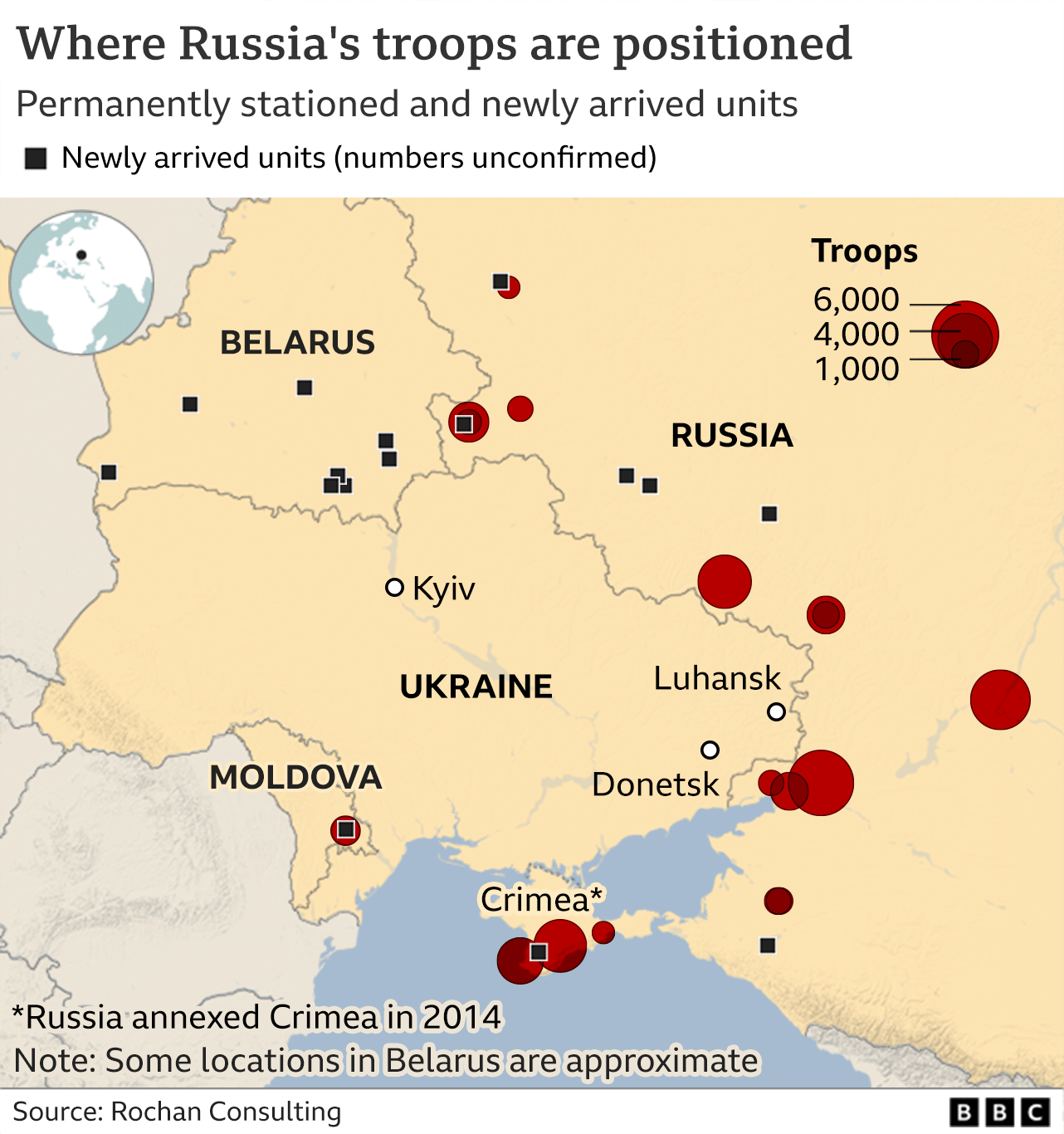
Britain is prepared to deploy troops to protect Nato allies in Europe if Russia invades Ukraine, Boris Johnson has said in a Commons statement.
The prime minister warned that President Putin would face “ferocious” Ukrainian resistance and “many Russian mothers’ sons will not be coming home”.
The UK and its allies would also respond swiftly and “in unison” with “severe” economic sanctions, he added.
Russia, which denies plans to invade, has built up troops at the border.
Some 100,000 Russian soldiers have been deployed.
The US has put 8,500 troops on alert to deploy at short notice, which Russia said caused it “great concern”.
Members of the Nato alliance, including Denmark, Spain, Bulgaria and the Netherlands, are sending more fighter jets and warships to Eastern Europe to bolster defences in the region.
In a statement made just hours after the announcement of a police probe into No 10 lockdown parties, Mr Johnson said: “The British Army leads the Nato battle group in Estonia and, if Russia invades Ukraine, we would look to contribute to any new Nato deployments to protect our allies in Europe.”
On sanctions, he said he and leaders of the US, France, Germany, Italy, Poland and the EU had agreed they would impose “co-ordinated and severe economic sanctions heavier than anything we have done before against Russia”.
“And we agreed on the necessity of finalising these measures as swiftly as possible in order to maximise their deterrent effect,” he added.
“We’ve already declassified compelling intelligence, exposing Russian intent to install a puppet regime in Ukraine.
“And we will continue to disclose any Russian use of cyber attacks, false flag operations or disinformation.”
Mr Johnson said the freedoms gained in Europe since the fall of the Berlin Wall must be maintained.
He said Russia was threatening to place a “gun to Ukraine’s head” but he still believed a diplomatic solution was possible.


Britain already leads a battlegroup in Estonia of around 1,000 troops – part of Nato’s response to Russia’s invasion of Crimea in 2014.
Since 2015, the UK has rotated dozens of troops to Ukraine to help train their armed forces. And in the past week the UK has been willing to supply Ukraine with lethal aid – light anti tank weapons along with around 30 specialist troops from the Army’s new Ranger Regiment.
In the words of one foreign-based diplomat, the UK’s response has been “more muscular” than many Nato allies. The rhetoric and warnings from UK ministers have also been stronger than most.
Some may interpret tough words and actions as a distraction from domestic political difficulties. But in reality the UK has taken a more robust response to Russia ever since the Salisbury poisoning.
Think of the decision last summer to send a Royal Navy Warship, HMS Defender, to deliberately sail within Crimea’s territorial waters – much to the anger of the Kremlin.
So it is not a surprise that Britain is offering to do more to defend both Ukraine and its Nato allies.
But Nato is an alliance – and reinforcing its eastern allies will not be a unilateral decision. The options include the possibility of putting forces into Romania and Bulgaria.
France has already indicated that it is willing to help out. Britain and the US are seen as two other potential countries who could help bolster the defences. Defence Secretary Ben Wallace is set to hold talks at Nato HQ in Brussels over the coming days, about possible options.

Labour leader Sir Keir Starmer said his party “stands resolute” in supporting Ukraine’s independence and sovereignty.
About half of the staff working at the UK embassy in the Ukrainian capital of Kyiv are to return to the UK, but Mr Johnson said the embassy would stay open.
The Kremlin has said it sees Nato as a security threat, and is demanding legal guarantees that the alliance will not expand further east, including into neighbouring Ukraine.
But the US has said the issue at stake is Russian aggression, not Nato expansion.
This video can not be played
To play this video you need to enable JavaScript in your browser.
Tobias Ellwood MP, chairman of the defence committee, suggested it was “not to late to mobilise a sizeable Nato presence in Ukraine”.
The prime minister said it was not a “likely prospect in the near term” as Ukraine is not a Nato member, adding “what we can do, and what we are doing, is sending troops to support Ukraine”.
Mr Johnson said Nato was unwilling to send troops into Ukraine itself and had to “beware of doing things… that would constitute a pretext for Putin to invade”.
Earlier, Foreign Secretary Liz Truss told MPs: “What we are doing is working very hard to make sure that Ukraine has the defensive weapons it needs, that it has the training it needs… and also that it has the support of the international community.”
Dozens of British troops have been in Ukraine since 2015 to help train their armed forces and last week it was announced the UK was supplying the country with short-range anti-tank missiles for self-defence.

Tensions over Ukraine
- EXPLAINED: Is Russia preparing to invade Ukraine?
- FROM KYIV: Ukrainians wait as Russia faces off with the West
- FROM BRUSSELS: EU ‘closest to war’ in decades over Russia-Ukraine crisis
- UK SUPPORT: UK says it is sending weapons to defend Ukraine

Ukrainians prepare for possible invasion



- PIONEERING GENIUS OR MURDEROUS MONARCH? The life of Elizabeth I
- ROSS ATKINS ON 6 MUSIC: The BBC News presenter swaps his desk for the DJ decks!

